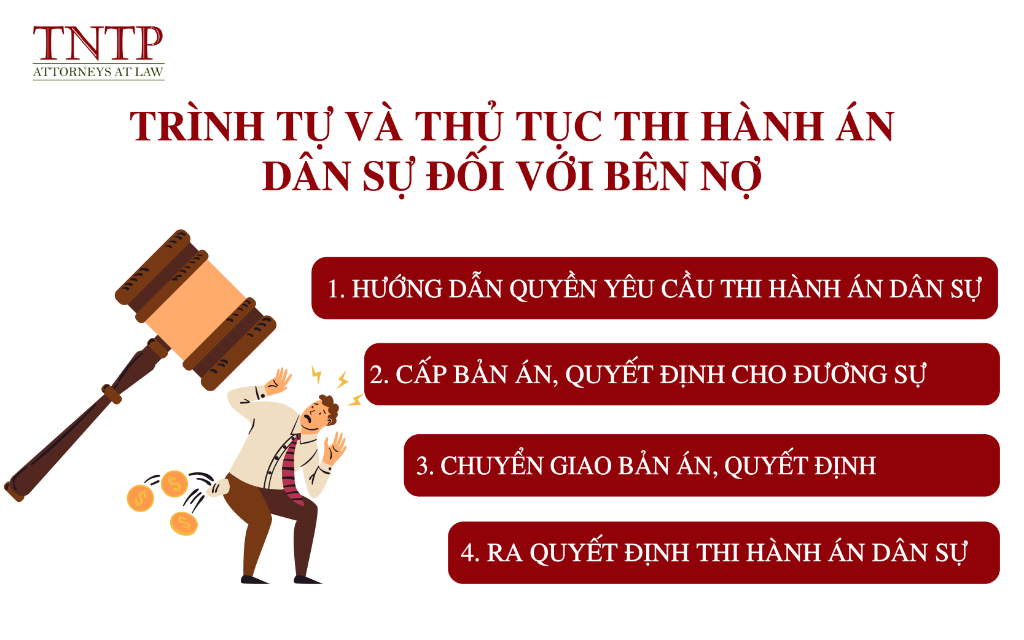Procedures for civil judgment enforcement for debtors

The stage of civil judgment enforcement plays a very important role in debt recovery because then, the judgment enforcement agency being a competent authority will have enough resources and human resources to carry out the judgment enforcement measures, which forces the debtor to perform the debt payment obligation in accordance with the effective decision or judgment of Court or Arbitration Center. In this article, let’s find out with TNTP the civil judgment enforcement procedure for the debtor.
1. Guidance on the right to request civil judgment enforcement
When issuing a judgment or decision, Court, Council dealing with the competition case, or the commercial Arbitrator must explain it to the involved parties, and at the same time clearly specify in the judgment or decision the right to request judgment enforcement, the judgment enforcement obligation, the statute of limitations for requesting judgment enforcement.
After the judgment or decision of Court takes effect, it must be respected by agencies, organizations and all citizens. Accordingly, enterprises, especially debtors, within the scope of their responsibilities, must strictly abide by judgments and decisions and take responsibility before the law for judgment enforcement.
2. Issuing judgments and decisions to involved parties
After the judgment or decision takes effect, Court, Council dealing with the competition case, or commercial Arbitration that has issued the judgment or decision specified in Article 2 of Law on Civil Judgment Enforcement must issue to the involved parties a judgment or decision with the words “For enforcement”. At that time, the plaintiff may proceed to send this judgment or decision together with the dossier to request the judgment enforcement agency to execute the judgment or decision.
3. Transfer of judgments and decisions
Depending on the type of judgment or decision that Court has issued, the judgment or decision must be transferred to the competent civil judgment enforcement agency immediately after the decision is issued or within 15-30 days from the date of legal effectiveness of decisions and judgments.
4. Issuance of judgment enforcement decisions
Active execution of judgments
Within 5 days after receiving the judgment or decision, the head of the judgment enforcement agency must issue a judgment enforcement decision in the following cases:
- Fines, retrospective collection of illicitly earned money and assets, court fees and charges;
- Refund of money and assets to involved parties;
- Confiscation into the state budget or destruction of material evidence and assets; other state budget remittances;
- Withdrawal of land use rights and other assets subject to remittance into the state budget;
- Decision on application of provisional urgent measures.
Within 24 hours after receiving the decision on application of provisional urgent measures transferred by the court or directly by the involved parties, heads of civil judgment enforcement agencies must issue judgment enforcement decisions and assign enforcers to organize the enforcement.
Enforcement of judgments on request
The time limit for voluntary judgment enforcement is 10 days from the date the debtor receives or is properly notified of the judgment enforcement decision. Upon the expiry of the above time limit, the debtor who has judgment enforcement conditions but does not voluntarily execute judgments will be subject to coercive judgment enforcement.
In case the debtor fails to perform his/her obligations according to the contents of the legally effective judgment or decision, the creditor has the right to file an application for judgment enforcement. At that time, the head of the civil judgment enforcement agency will issue a judgment enforcement decision, the judgment enforcement agency will then perform the determination of judgment execution conditions, and coercive judgment enforcement according to the provisions of Law on Civil Judgment Enforcement.
Current law does not specify the time to complete a debt dispute, because depending on the case, the ability to recover debt will proceed quickly or slowly. Enterprises that want debt recovery to take place quickly and effectively need to actively collect information and conditions for judgment enforcement of the debtor and provide it to the judgment enforcement agency. Besides, it is necessary to seek the advice of legal expertise units to ensure their rights.
Best regards,



